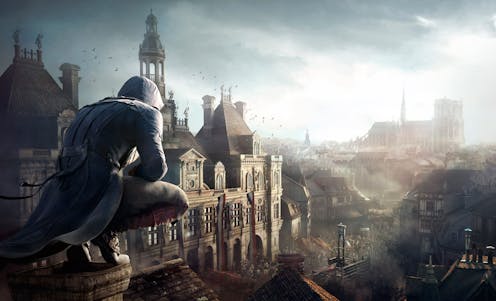Even in the colourful world of video games, most players demand historical accuracy
- Written by Jacqueline Burgess, Associate Lecturer in International Business, University of the Sunshine Coast

Some of the most popular video game series are those that use historical settings, and research has revealed players have extremely high standards when it comes to the accuracy of the history presented.
We surveyed players of the Assassin’s Creed series, one of the most famous video game series to use historical settings, to understand how important accurate depictions of history in video games were for players.
The Assassin’s Creed series depicts a millennia-old conflict between the secret Assassin Brotherhood and Templar Order. In the majority of games, the player takes control of a historical assassin in a historical setting, but with cuts to a modern-day, science-fiction framing story.
The games are known and loved for their historical tourism appeal. The series has allowed players to explore Cleopatra’s Egypt, the Middle East during the Third Crusade and the Italian Renaissance among other settings.
And players expect to see due diligence done when it comes to reflecting real-life historical facts and settings.
Respecting history in gaming
58% of players felt video game developers should minimise changes to the historical record. Another 21% felt it depended on the game. For example, some respondents accepted developers could and should make changes for alternate history or fantasy games.
One noted, “unless a major part of the gameplay is creating an alternative history, or there’s a major sci-fi/fantasy element making the historical accuracy unimportant, developers should strive to make their games as accurate as possible”.
In general, respondents felt games needed to be fun and entertaining, so changes to history should be made to ensure that. Otherwise, the history developers were using should be respected.
As another respondent put it, “the developers should stay as close as possible [to historical fact] unless doing so would hinder the gameplay or story.”
Some respondents even thought changes to the historical record should be disclosed to players in some way.
Accuracy in gaming
Video games are one of the newer popular entertainment media but are sometimes still thought of as an industry for adolescents, despite the average age of players in Australia being 35.
Our research shows players have high expectations when it comes to the accuracy of information being presented to them.
With over three billion worldwide players, video games are how a lot of people are being exposed to history.
And they are very influential in shaping players views about history. Video games are interactive which means their players can actively engage with historical events and people and explore historical worlds.
Some of the most popular and long-running video game series, such as Assassin’s Creed, Total War, and Civilization use historical settings as a key part of the game’s plot and appeal. For example, the Assassin’s Creed series alone has sold more than 150 million copies since 2007.
Introducing audiences to history
It used to be that film was the most influential media for exposing audiences to history. Thanks to the popularity and interactivity of video games, this has shifted somewhat.
Video game developers have embraced historical accuracy when creating their games. For example, during the development of L.A Noire, a film-noire inspired game set in Los Angeles in 1947, over 180,000 sources including newspaper articles, photographs, and police records were examined to ensure the city was recreated accurately.
The Assassin’s Creed series itself is also well-known for hiring historians and academics as consultants and recreating detailed versions of historical cities for its games.
Read more: Assassin's Creed TV series: why it's so hard to adapt video games for the screen
For Assassin’s Creed Unity, set in Revolutionary Paris, developers consulted over 150 maps of the city and spent two years modelling Notre Dame. This even involved tweaking individual bricks and consulting historians to establish which paintings were on display.
The audience hunger for this sort of rigorous research and details in games has created opportunity for video game developers and companies.
Developers can add their use of history to their marketing. Branded podcasts, social media, tie-in books and website content can explore the research developers have undertaken. They can also present information about the actual history and explain why changes were made.
The popular History Respawned podcast, which explores the history presented in popular video games, is one model the industry can use. Another is the in-game historical encyclopaedia the Assassin’s Creed series features, and other games could use.
Video games also regularly offer high-priced collector and limited editions with statues, soundtracks and artbooks included, and these could be another avenue for providing players with the historical information they want.
Including historical inaccuracy
However, what is accurate and what is not is not always obvious.
Notre Dame, as it appears in Assassin’s Creed Unity, features the cathedral’s famed spire. However, historically it wasn’t installed yet, and was added after test players felt the cathedral was inaccurate if it wasn’t featured.
When it comes to making video games with historical settings, developers must carefully choose what accurate and inaccurate aspects they include. Sometimes, making a game that matches what a player believes is authentic to the time period actually requires inserting inaccurate aspects.
And, of course, a game has to be fun. The ship-to-ship combat in Assassin’s Creed Black Flag, set during the Golden Age of Piracy, is much, much faster than actual naval battles and features tactics real-life pirates would never use. And yet Black Flag is one of the most beloved games of the series.
Developers have a tricky paradox to navigate. To give the players what they want, they sometimes have to give them what it appears they do not want.
Authors: Jacqueline Burgess, Associate Lecturer in International Business, University of the Sunshine Coast





